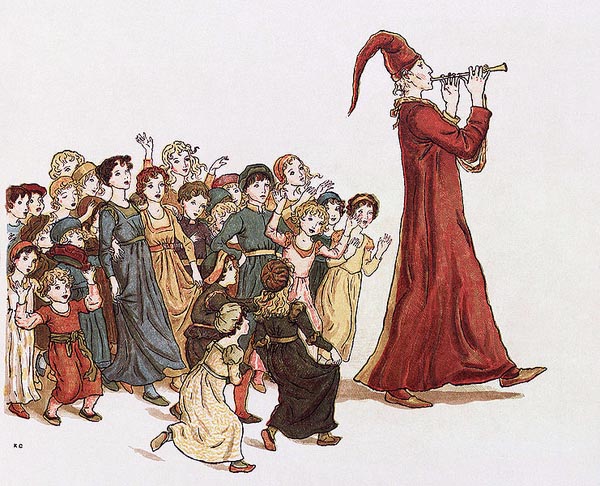 |
| The Pied Piper of Hamelin (Wikipedia) |
Note: From an Irish pub crawl to the luring of rats to their deaths--and with a group of mystical sleepers thrown in--June is just weird!
Get Ready: Can you tell the story of "The Pied Piper of Hamelin"?
Last time we looked at various June days commemorating ecological issues and people helping people. This time, let's see some that are literary in nature.
The first is Bloomsday, on June 16th. I have written about this before: James Joyce's groundbreaking novel Ulysses follows the "unity of time" concept derived from Aristotle's Poetics. That is, it all takes place within the space of a single day, and that day, for Ulysses, was June 16th.
Why that day? It was the date of Joyce's first day out with Nora Barnacle, who later became his wife. Today it's celebrated by Joyce fans in his native Dublin and all over the world with outings of their own--mainly to pubs.
--------
June 26th (or sometimes July 22nd) is a celebration of a different kind: Rat-Catcher's Day. Though it might not sound literary, it actually memorializes a legendary German event made famous in the English-speaking world in a poem, known as "The Pied Piper of Hamelin," by Robert Browning.
The reason there are two dates results from the fact that the town of Hamlin uses the date given by the Grimm Brothers--June 26, 1284--but Browning chose to use another traditional date, July 22, 1376.
The story says that the German town of Hamelin was having a problem with rodents (which, you may recall, were also associated with the Black Plague). A stranger showed up in brightly-colored clothes and promised to lure the rats away--for a fee. He did so by playing a tune on a pipe, but when the people refused to play, he lured their children away in revenge.
The whole "Rat-Catcher Day" may seem like a joke, but with all the other holidays we've seen, is it so far-fetched?
--------
Finally, Seven Sleepers' Day on June 27 is another German celebration based on a legend. This derives from a much older Christian legend about the "Seven Sleepers of Ephesus," seven youths who hid in a cave to escape persecution around 250 CE--and emerged 300 years later.
There is also a bit of weather lore associated with the day: locals believe that the weather on that day gives an indication of the average summer weather for the next seven weeks.
--------Read more:
- Bloomsday: https://en.wikipedia.org/wiki/Bloomsday
- Rat-Catcher's Day: https://en.wikipedia.org/wiki/Ratcatcher%27s_Day
- Seven Sleepers' Day: https://en.wikipedia.org/wiki/Seven_Sleepers%27_Day
Practice: Match the term to its definition below:
- emerged (from)
- far-fetched
- literary
- locals
- lured
- outings
- pied
- rodents
- the Black Plague
- unity
- multi-colored
- enticed; attracted
- came out (of)
- people who live (or lived) in the area
- hard to believe
- excursions; pleasure trips
- oneness; harmonious whole
- related to literature
- mice, rats, and so on
- a medieval epidemic that killed 30-60% of all Europeans
Answers are in the first comment below.
Submitted to the Shenzhen Daily for May 4, 2017


Answers to the Practice: 1. c; 2. e; 3. h; 4. d; 5. b; 6. f; 7. a; 8. i; 9. j; 10. g
ReplyDelete